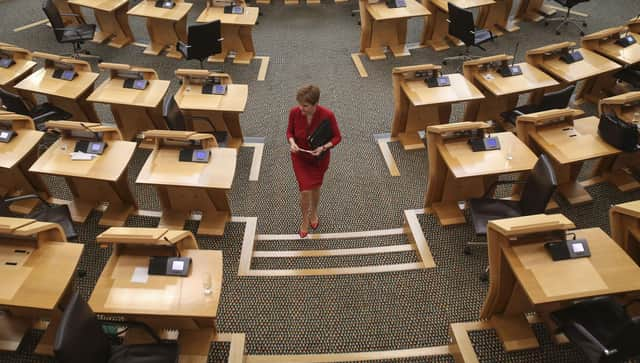Scottish independence is a costly con-trick so let’s respect the decent values of inter-dependence – Brian Wilson


An old-fashioned concept called inter-dependence cries out for revival, as demonstrated by the annual exchanges over GERs statistics.
The facts are not in doubt. Even most Nationalists have given up denying the work of their own government’s statisticians. Scotland spent £15.1 billion more last year than it raised in taxes, a GDP deficit of 8.7 per cent. Facts. Chiels. Winna’ Ding.
Advertisement
Hide AdAdvertisement
Hide AdTheir opponents use these figures to assert dependence on being part of the UK. The Nationalists’ response is that they represent an indictment of the constitutonal status quo, rather than its justification.
In advancing that case, Kate Forbes sounded like the zealot of a cult, reliant on faith rather than evidence, more than a responsible Finance Minister. Yet pensions, benefits and jobs are not funded by abstract conviction. The stakes for our children are higher than for one-dimensional political believers.
Accepting realities should not, however, equate to endorsing the “dependence” line. I do not feel the least dependent or subsidised because I live in a part of the UK – and of Scotland – where per capita public expenditure is higher than elsewhere.
There are good reasons, historic and current, for the differentials of inter-dependence. It is only when statistics become weaponised in a battle of flags – which Scottish politics has been reduced to – that these arguments of fairness are obscured. Personally, I prefer fairness to flags.
That was a more widespread view in the 1970s when statistics might have pointed in another direction. The vulgar “Scotland’s Oil” campaign ultimately repelled most Scots who concluded they faced much the same challenges as working people in Newcastle, London and Liverpool. So why would we not share in transient good fortune?
Reciprocally, hardly anyone in England cares that £2,000 more per head is spent on public services in Scotland than in their own communities. It barely impinges upon them. Different parts of the state we live in have different needs, different demography, different geography. So what?
That principle was enshrined in the Barnett Formula which has served Scotland incredibly well. It built on the longer-established principle that Scotland’s characteristics justified proportionately higher spending – for example, from the earliest days of the NHS.
Until recently, these differentials were used to exemplify the politics of fairness – which is where they still belong. It is only the grievance-ridden constitutional debate, in which a shoulder must be found for every chip, that turns them into weapons to be paraded or denied.
Advertisement
Hide AdAdvertisement
Hide AdFar removed from Ms Forbes’s nonsense, I read something rational from another Nationalist perspective. George Kerevan, an old leftie, pointed out that, in theory, the deficit would become a surplus if Scotland raised far more in taxes. In other words, our deficit is not endemic but due to the UK’s “neoliberal tax regime”. That is an honest critique, to be taken or left.
I doubt if it will feature in the official SNP prospectus but even if it did, there would be a major problem – ie whenever they use existing powers to increase taxes, the result is less revenue rather than more. If the Kerevan solution was applied, the outflow of taxable individuals and businesses would soar accordingly, across what would by then be a fiscal border.
When the Scottish Parliament was created, I doubt if anyone expected the GERs deficit, 20 years later, to be widening. Why has this happened? Contrary to myth, there is no shortage of powers to make Scotland more enterprising, more dynamic, more interesting. That might even have made the constitutional case for going further.
Instead, the reality is an abysmal absence of industrial or business policies which might galvanise the Scottish economy and its wealth-creating potential. We have government by mediocrity in which the only strategy is “send more money” while insisting the solution lies in separating ourselves from that lifeline. It is a con, even more than in 2014.
The alternative politics is not to wave a different flag but to espouse positive belief in inter-dependence based on need – within Scotland, within the UK, within the world. Does division really sound better or easier than that?
A message from the Editor:
Thank you for reading this article on our website. While I have your attention, I also have an important request to make of you.
With the coronavirus lockdown having a major impact on many of our advertisers - and consequently the revenue we receive - we are more reliant than ever on you taking out a digital subscription.
Subscribe to scotsman.com and enjoy unlimited access to Scottish news and information online and on our app. With a digital subscription, you can read more than 5 articles, see fewer ads, enjoy faster load times, and get access to exclusive newsletters and content. Visit www.scotsman.com/subscriptions now to sign up.
Advertisement
Hide AdAdvertisement
Hide AdOur journalism costs money and we rely on advertising, print and digital revenues to help to support them. By supporting us, we are able to support you in providing trusted, fact-checked content for this website.
Joy Yates
Editorial Director
Comments
Want to join the conversation? Please or to comment on this article.